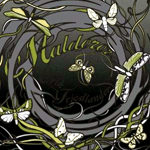Erik Friedlander: Maldoror

[Brassland; 2003]
Rating: 8.3
In 1846, Isidor Ducasse was born to a French consular official in Uruguay. By 1862, he had graduated from a French boarding school, where he's said to have excelled at arithmetic, drawing, and Latin verse translation. He was known to his peers as a silent boy who wrote "bizarre and obscure" poems. At 21, he was described by his editor as "a big, brown-haired young man, unshaven, nervous, of regular habits, and hard-working," known to his neighbors for banging out verses at the piano. A year later, under the pseudonym le Compte de Lautr�amont, he published the Chants de Maldoror. His death in 1870-- at 24, the age of your humble reviewer-- went unexplained and unnoticed, fulfilling a line from his last book: "I know my annihilation will be complete."
That it was, until half a century later, when surrealists started gushing over his dark wit and transgressive logic. Maldoror excited Andr� Gide to the point of delirium, and Andr� Breton went so far as to call it "the expression of a total revelation which seems to surpass human capacities." Maldoror is the kind of prose work that only a poet could love, a lavish and rapt necrocopia, fleshed out with obsessive rigor in a spirit that can truthfully be called cruel. If it has a plot, it is the narrator's descent into savagery and madness as he decides to follow the thorny path carved by his evil twin, Maldoror. But the whole thing is a little too decadent and far too choppy to be paraphrased.
Producer Michael Montes, we are told, took the risk of making Maldoror the basis for an album of improvisations by New York cellist Erik Friedlander, his first solo release. The formula is simple: put a piece of Ducasse's text in front of the cellist in the studio, along with a few notes, and let him compose music to match it on the spot. It panned out, more or less, not because Maldoror was conceived as a series of songs, but because Erik Friedlander can do things with a cello that should have a reasonable listener fearing for her life. Rostropovich one second and Rottweiler the next, Friedlander is a credible threat, working over the poet's perverse logic with power tools. The results are surprisingly literal settings of the poems, some falling flat, some holding up to repeated listening as through-composed studies would. Others work better as scores to enhance the creepy effect of the prose excerpts printed in the well-designed (if maddeningly typeset) liner notes.
We hear a single detuned tendril blossom into a blurry wall of thorns, cautioning the weak reader to turn around before he reaches the gate. "For unless he bring to his reading a rigorous logic and mental application at least as tough enough to balance his distrust," warns Lautr�amont, "the deadly sins of this book will lap up his soul as water does sugar." He makes good on this promise immediately, with a passage commanding the reader to grow out his fingernails so he can skewer the heart of a prepubescent boy, "but not so that he dies, for if he died you would miss the sight of his subsequent sufferings." The wind starts up, but its tenor lament is interrupted by gratings and gnashings. "Then dogs, driven wild, snap their chains and escape from far-off farms," the poet starts in, as uneven figures come to the surface. "Suddenly they stop, stare in every direction with a fierce unease, their eyes ablaze... as elephants in the desert look up one last time at the sky before dying, desperately lifting their trunks..." Screeching octaves whine up at the moon, gasping for punctuation, sawing their own torsos with bitter fifths.
Dawn breaks suddenly, and it's time for some airier mind games. "O stern mathematics, I have not forgotten you since your learned teachings, sweeter than honey, filtered through my heart like a refreshing wave," pluck the arpeggios as they sketch a stream of open chords. Just as a halting melody surfaces, it gets swallowed by a honeydew froth, as math clears the air with "an excessive coolness, a consummate prudence, and an implacable logic." Not for long. A madwoman tiptoes in-- gnawing, scraping, sobbing, scribbling-- as if driven "like a poplar leaf blown along by the whirlwind of unconscious powers" toward a world "she glimpses again through the mists of a demolished mind." No sooner does she vanish than the poet begins a long slow metamorphosis, with an earthmelting drone offering up a fine bouquet of mud and mulch. "I am filthy. Lice gnaw me. Swine, when they look at me, vomit." As the reader looks on in horror, the cello drops tendrils as its master turns to fungus. "Seated on a shapeless chunk of furniture, I have not moved a limb for four centuries. My feet have taken root in the soil forming a sort of perennial vegetation not yet quite plant-life though no longer flesh as far as my belly is filled with parasites," the poet declares proudly. "My heart, however, is still beating."